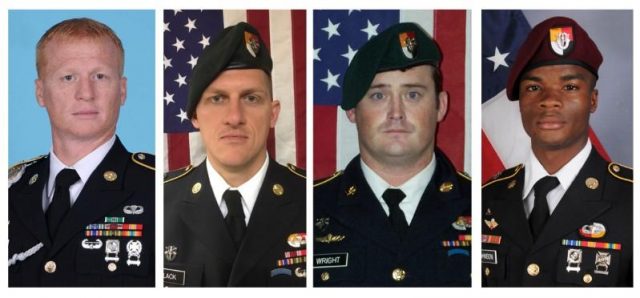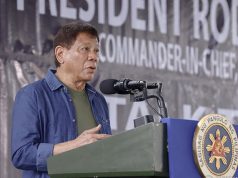
WASHINGTON — Senator John McCain, chairman of the Senate Armed Services Committee, said on Thursday he may consider issuing a subpoena because the White House has not been forthcoming with details of an ambush in Niger that left four U.S. soldiers dead.
The attack earlier this month, which U.S. officials suspect was carried out by a local Islamic State affiliate, has thrown a spotlight on the U.S. counterterrorism mission in the West African country, which has about 800 U.S. troops.
“It may require a subpoena,” McCain said when asked what steps his committee might need to take to determine what happened to the four troops.
Questioned what information the committee still needed, McCain said: “Everything.”
Asked whether the White House had been forthcoming with the information needed by the committee, he added, “of course not.”
White House chief of staff John Kelly said a Pentagon investigation is aimed at finding out what happened in Niger.
“An investigation doesn’t mean anything was wrong. An investigation doesn’t mean people’s heads are going to roll. The fact is, they need to find out what happened and why it happened,” he said during an appearance in the White House briefing room.
U.S. Defense Secretary Jim Mattis told reporters on Thursday that the incident was under investigation and defended the military’s response, even as he acknowledged that it did not yet have all the accurate information on the incident.
Initially, the Pentagon announced that three soldiers had been killed in the ambush. The body of a fourth soldier, Sergeant La David T. Johnson, was recovered more than a day later and questions have been raised about why it took as long as it did.
“The U.S. military does not leave its troops behind and I would just ask that you not question the actions of the troops who were caught in the firefight and question whether or not they did everything they could in order to bring everyone out at once,” Mattis said before the start of a meeting with his Israeli counterpart.
McCain said he had had a good conversation with President Donald Trump’s national security adviser, H.R. McMaster, and hoped the White House would eventually provide the information needed by the committee.
From initial accounts, the 40-member patrol, which included a dozen U.S. troops, came under swift attack by militants riding in a dozen vehicles and on about 20 motorcycles.
The mission had been seen as a relatively lower-risk endeavor for America’s elite commandos and there was no armed air cover at the time that could carry out air strikes if necessary.
Mattis said contact was considered “unlikely” but did not provide further details.
“There’s a reason we have U.S. Army soldiers there and not the Peace Corps, because we carry guns. And so it’s a reality, it’s part of the danger that our troops face,” he said.
Under heavy fire, U.S. troops called in French fighter jets for air support, but the firefight was at such close quarters that the planes could not engage and were instead left circling overhead.
U.S. officials have said French aircraft were overhead within 30 minutes.
Mattis said a contract aircraft evacuated the dead U.S. soldiers and Johnson’s body was found later by local nationals.
The U.S. military’s Africa Command said the soldiers were in the area to establish relations with local leaders and deemed it unlikely that they would meet resistance.









